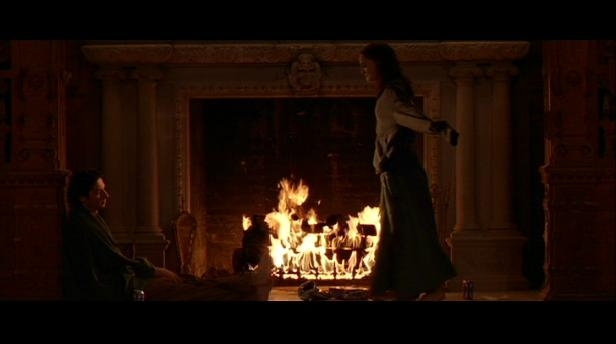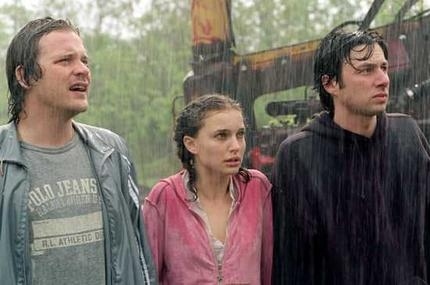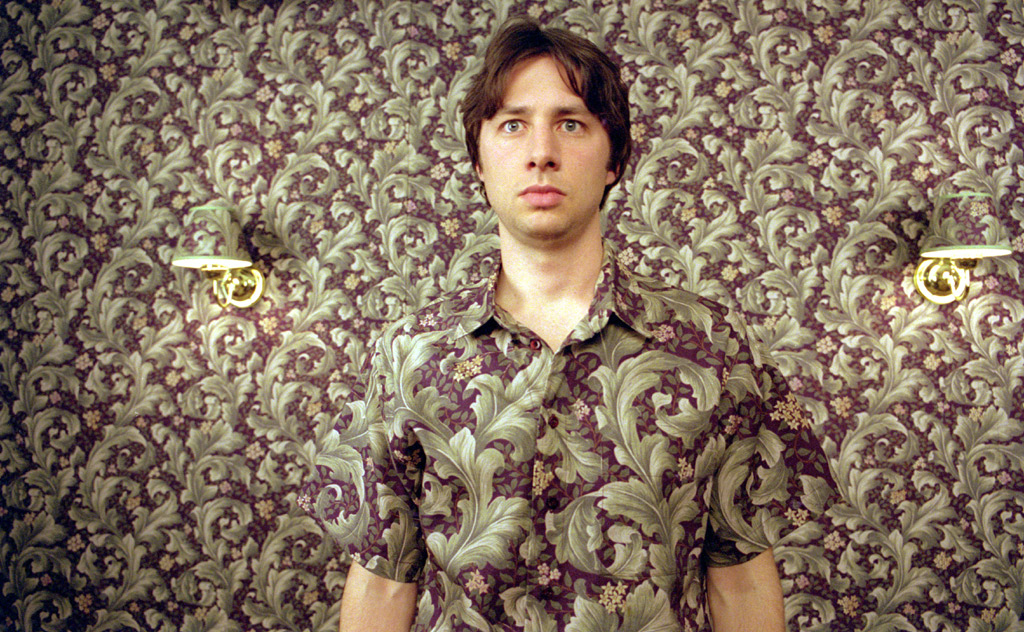That's the question I've been asking myself for the past week, since Zach Braff turned to crowd-funding website Kickstarter in an attempt to raise two million dollars for his new film (Wish I Was Here) and subsequently caused the internet to explode in rage. Not since The A.V. Club comment section's collective decision to hate Mumford & Sons have I seen such automatic revulsion directed at somebody.
All this loathing has two bases: first, many people feel like Braff is abusing the Kickstarter model; Kickstarter's purpose is to connect artists/entrepreneurs who can't find funding anywhere else, with patrons interested in supporting artistic creativity (and maybe grabbing a little swag along the way). As a famous actor, Braff could certainly find funding somewhere else, but he chose to turn to crowdsourcing because he wants complete creative control over his film. Without studio backing, he wouldn't have to succumb to studio input. In a video Braff released, explaining why he turned to Kickstarter, he explains some such changes a studio executive might suggest. The examples he gives are hyperbolic (replacing Jim Parsons with Justin Beiber as a pool boy) and not too realistic. If a studio was to back his movie, they would know what they were getting into. They wouldn't try to turn the indie script they just purchased into a summer blockbuster. The fact is, filmmakers far more prestigious than Zach Braff have been able to translate their vision through the studio system, so Kickstarter isn't exactly his only option.
Probably the simpler reason though, is that some people HATE Garden State. Hate it. Despise it, even. There's a large chunk of the online, pop-culture obsessed community that sees Garden State as twee, pretentious, indie-bate garbage. They think the soundtrack (Coldplay, Postal Service, Nick Drake) is too obvious and stands in as a proxy for actual tonal development. They think the dialogue tries too hard to be profound and ultimately sounds effected. And they really think Natalie Portman's character is an overly precious, quirky, indie girl cypher.

I watched Garden State for the first time when I was a freshman in high school, so the context of my initial viewing of the film can't be disregarded. There's something refreshingly simple about the way we defined ourselves in high school by the pop culture we liked. I was 14, trying to develop unique tastes and interests in order to separate myself from the other post-pubescent mouth breathers trudging around the hallways between classes. I had just accidentally stumbled upon The New Pornographers, which led to Rilo Kiley, which led to Modest Mouse, which led to The Mountain Goats. I took advantage of my parents' Blockbuster card and rented Pulp Fiction, Ghost World, Harold and Maude and Eternal Sunshine of the Spotless Mind. Now I'm older and the obsessive pop culture blogosphere has exploded, resulting in hundreds of dorm room reviews for every Miranda July film and Guided by Voices album, but back then, the "indie" community seemed a lot smaller. When I encountered another Sleater-Kinney fan, it seemed like the universe uniting two cool kid pins in a haystack of Nickelback fans. I was young and naïve and thought every underappreciated artist was directing their work at my deeply profound soul.
Needless to say, I loved Garden State.

It's got all the ingredients for detached, indie kid catnip: Zach Braff, who I loved in Scrubs, and whose face constantly resonates bafflement; Natalie Portman, with her quirky affectations and insistence that "New Slang" would change our lives, that still seemed completely charming in 2004; an odyssey through the underworld of suburban New Jersey; lots of shots of contemplative faces; a sense of ennui, which is like boredom, but so much deeper; lots of people partaking in drugs in '70s-style rec rooms; and yes, a soundtrack filled with Coldplay, Nick Drake and The Postal Service. It's a movie about apathetic twenty-somethings, for teenagers with dreams of becoming apathetic twenty-somethings.
Throughout high school, I watched Garden State about a dozen times, mostly because they would rerun it on IFC all the time. Even though I knew at the time I couldn't quite identify with Andrew Largeman's story (a 26-year-old failed actor, paralyzed by the lithium his psychiatrist father has been feeding him since he was nine, returns home to deal with his mother's death), I identified with the themes and tone of the film. There was a "No Day But Today" message going on, and a far less abrasive one than the cast of Rent screaming it at me. Samantha's (Portman) speech about laughing so you don't cry very much resonated with my pseudo-angsty teen heart. Even Jean Smart's brief appearance as a mother insistent on believing in her son, while he would rather have her accept his mediocrity, felt close to home. Mostly, I just really liked the depiction of middle-class, suburban New Jersey. It seemed eclectic and hip and warm in a way my hometown in South Florida never did. Now I realize that most people look at their hometowns as empty, boring prisons while they're in high school.

When I heard about the Zach Braff Kickstarter campaign, I realized that I hadn't seen Garden State since I was in high school. Like everybody does in college, I engaged with a lot of pop culture, further developed my pallet, and both consciously and subconsciously altered my tastes. I learned online about the reputation Garden State had developed as a phony, pandering "indie." I read about Nathan Rabin's stock character designation of Natalie Portman (but, more so, Kirsten Dunst in Elizabethtown) as a "Manic Pixie Dream Girl." I've heard a lot of people in recent years describe Garden State as "that movie you really liked in high school and then realized was terrible." It's become the standard for movies about sensitive hipsters, which people who hate hipsters tend to resent. It's led to an automatically triggered backlash to everything involving Zooey Deschanel, Lena Dunham or Michael Cera. When Braff described the movie he wanted to crowd-finance as a "tonal sequel to Garden State," he had to know what was coming.
I knew that my defense of Garden State was likely affected by high school nostalgia, so I decided to re-watch the movie for the first time in about five years. Was it a soul-lifting revelation that helped me experience film and, more importantly, myself in a completely new way? No, but I'm a jaded twenty-three-year-old, so nothing does that. But I thought it was a good movie. Maybe even a great one. If I felt any less affection for it, it had more to do with me and not the film. I realized how it might elicit twee-bashing rants from some people; but, then I realized those people probably hated Little Miss Sunshine, so who cares about them?

I did notice a few things that younger, more forgiving me might have overlooked. Probably the biggest complaint about the movie is that every character besides Andrew (Braff) is underdeveloped, especially Portman's Samantha. I don't entirely agree: Andrew's father (Ian Holm) is understated and detached, befitting his character, and stoner pal Mark (Sarsgaard) is a great depiction of that friend you leave behind when you move away, who has grown more than his bored, townie persona might suggest. I did begin to understand the criticism about Sam though. She's a little too precious, especially in the first half of the movie. When she makes weird noises in her bedroom with Andrew in order to feel "completely original," I had just about had it with her quirky ass. But Natalie Portman plays her well enough to keep her from becoming too precocious. She could be a little more fleshed out, but ultimately, it's a movie about Andrew, and she represents the life he's been ignoring up until they meet. Maybe she is a Manic Pixie Dream Girl, but so is Holly Golightly, and you don't see everyone trashing Audrey Hepburn.

The dialogue is a little uneven; more than once, Andrew says something, and then repeats it with verbal italics for emphasis. ("This is love. This is love." "So, what do we do? What do we do?") Also, the final scene doesn't really make sense. He's already decided to be with Sam, so why does he have to fly back to L.A.? He doesn't have a job or any life to speak of back there. It's just an excuse to complete a thematic loop set up in the first scene in which he remains indifferent to the plunging airplane he's in, by then having him get off the return flight and "live life" with Sam. Also, it allows him to pull Sam out of a phone booth and kiss her in an empty luggage claim, the most indie of places. And the less said about the "infinite abyss" sequence, the better.
But, I also noticed new things that I was pleasantly surprised by. I never thought about Zach Braff's acting before, but it's spot on. Yes, it's probably easy to play numb, but the way he becomes more and more animated as the film goes on is really well played. Also, the movie looks great. When they're driving around Jersey on Andrew's bike, I was reminded why I fell in love with the movie in the first place. And that shot of Andrew wearing the floral print, standing in front of the wallpaper with the same pattern is still pretty funny.

Garden State is not a perfect film, but it is a deeply personal one. I'm not ashamed of loving it the way I did in high school, despite the internet's backlash against it. It's a great movie to ease high school kids into the worlds of Hal Ashby, Woody Allen and Mike Nichols. Will I be donating to Zach Braff's Kickstarter? No. But I hope the movie he makes is as good as or better than Garden State. And I hope it pisses off the internet.

